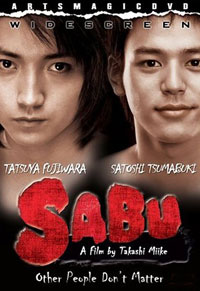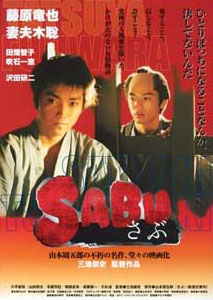 The legendary gory yakuza & horror film director Takeshi Miike tackles a traditional samurai era jidai-geki with Sabu (2002), set in Edo beginning 1603. It opens on the emotional lives of sensitive & tragic children, including Sabu, whose parents & sister died in a fire when he was eight.
The legendary gory yakuza & horror film director Takeshi Miike tackles a traditional samurai era jidai-geki with Sabu (2002), set in Edo beginning 1603. It opens on the emotional lives of sensitive & tragic children, including Sabu, whose parents & sister died in a fire when he was eight.
We see Sabu, at age thirteen, working in a little shop, & the girl who loves him, Osue (Kazue Fukiishi), is heartbroken. His friend Eiji is likewise orphaned, & a young girl, Nobuko, who had always loved Sabu, has become indifferent to tragedy after her sister hung herself.
With a leap forward in time we next see them grown, Sabu now played by Satoshi Tsumabuki, & they are still afflicted with tragic lives.
Ishikawa Island is a labor colony to which Eiji (Tatsuya Fujiwari) was sent unjustly. This labor colony really existed, right up until 1912.
Nobuko (Tomoko Tabata) has ended up prostituted. And Sabu still works for next to nothing at the rice paper doors shop. Except he loses his position due to his continued support of Eiji.
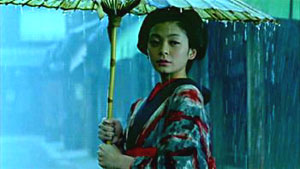 Nobuko wishes to run away with him, but Sabu feels he owes Eiji so much, he can't abandon him to his fate, plus he's furtively in love with Osue, not Nabuko who he regards more like a sister. Nobuko wishes to run away with him, but Sabu feels he owes Eiji so much, he can't abandon him to his fate, plus he's furtively in love with Osue, not Nabuko who he regards more like a sister.
Sabu wants to start a shop with Eiji as soon as he's free, to which Nobuko amends hopefully, "You, me, & Eiji."
Though Sabu is the conscience of the film & thus the title character, he's actually a secondary protagonist, after Eiji.
Eiji begins to cultivate very private plans for when he's released, plans that could well result in his own death.
On the island he's badly injured saving another man's life. Sabu visits with medicine to help him heal, & weeps copiously that his friend will always walk with a game leg.
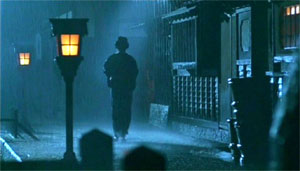 We have a tale of love, deep friendship, tragedy, & injustice. We have a tale of love, deep friendship, tragedy, & injustice.
Tomoko Tabata, who was only nineteen years old when he played Eiji, is like a new Hashizo Okawa who was the prettiest male lead of the '50s & '60s.
Whether from Miike encouraging great work or from the young actor's inate brilliance, he comes off brilliantly, not like the usual youth-star who tend at best to be only adequate.
As with other examples of the new humane jidai-geki exemplified by Yoji Yamada's Twilight Samurai (Tasogare Seibei, 2002), character is more important than swordplay, dramatic content trumps action.
But for viewers who must have it, there certainly is action, notably when Seiji, though crippled, fights vicious yakuza prisoners.
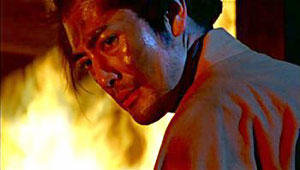 The choreography for the few scenes of violence is brutal & realistic. Since the characters are not trained samurai, these moments of physical conflict are crass, cruel, & homely. The choreography for the few scenes of violence is brutal & realistic. Since the characters are not trained samurai, these moments of physical conflict are crass, cruel, & homely.
And a concluding scene for Matsuda (Naomasa Rokudaira), Noboku's pimp, finds this terrible, terrible man performing one heroic act before committing suicide awesomely in a mesmerizingly horrific inferno.
Seiji, released at long last from the prison isle, warns Sabu not to be near him, as he plans to "raise hell" getting revenge.
I don't want to give it away, so anyone who knows the revenge motifs of Japanese period films will have to wait to find out if there is or is not the usual bloodbath as climax!
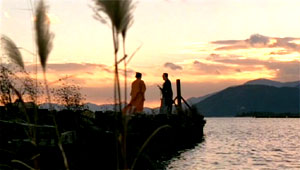 But I can tell you Sabu strives to convince Eiji not to take this road. Any viewer with a heart will by now hope he won't do it, as so many care for him, & it's not too late to live a decent artisan life. But I can tell you Sabu strives to convince Eiji not to take this road. Any viewer with a heart will by now hope he won't do it, as so many care for him, & it's not too late to live a decent artisan life.
Although Sabu was made as a telefilm, it is not at all lacking in big-screen qualities, as it's Miike directing after all, & when he puts his mind to doing a project well, he's apt to show genius.
And it has an intelligent script by Hiroshi Takeyama based on a story by Kurosawa's favorite novelist, Shugoro Yamamoto, whose brilliant tales have been adapted to such fine films as After the Rain (Ame agaru, 1999), Kill! (Kiru, 1968), Red Beard (Akahige, 1965), & Sanjuro (Tsubaki Sanjuro, 1962).
Period films when made for tv tend to star mere kids to capture young viewers, & are more about the soap opera angle than the history or action. But this one's specific genre is called "Loyalty Drama" with a severity that will appeal to jidai-geki fans even though it is about the artisan class rather than samurai.
copyright © by Paghat the Ratgirl
|
